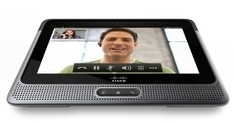

It has been revealed at this week’s Cisco Live event in Las Vegas that Cisco’s much-anticipated Cius enterprise tablet is getting its share of business app support.
SAP-owned Sybase is rolling out mobile-device security and application-management software support designed to help developers build and deploy enterprise applications on the Cius, which is expected to launch 31 July with a 7-inch model.
In addition, Lexmark is unveiling a mobile printing application for the device, Spanlink Communications is introducing a mobile social media application and RBM Technologies is debuting a visual retailing application.
All that comes just weeks after Cisco officials announced AppHQ, an application store for the Cius that will feature commercial software offerings.
Cisco announced the Android-based Cius in June 2010. The device, which will come with a price of about $750 (£470), will integrate a number of Cisco-branded products, including TelePresence immersive video collaboration, WebEx online meeting applications, Quad social software and Jabber messaging.
The Cius can sit in a docking station or be used on the go, offers Wi-Fi and broadband connectivity, and will be managed by Cisco’s Unified Communications Manager software. Though Cisco will offer commercial applications through AppHQ, users also will have access to the Android applications marketplace.
Sybase officials said their software support for the Cius follows similar support for other mobile devices, including Android smartphones and tablets, Apple’s iPhones and iPads, Research In Motion’s BlackBerry products, and devices running Microsoft’s Windows Mobile and Nokia’s Symbian operating systems.
Sybase software supporting the Cius will include management and security offerings from Afaria and the Sybase Unwired Platform. The support will offer Cius users enterprise-grade management, security and collaboration capabilities.
“Our ability to rapidly support the latest devices on our mobile enterprise application platform and ensure they are enterprise-ready is unmatched in the industry,” Terry Stepien, president of Sybase iAnywhere, said in a statement. “The Cisco Cius running on Sybase Unwired Platform will offer customers a new class of highly collaborative and secure productivity apps, which will continue advancing tablet adoption in the enterprise.”
Lexmark’s Mobile Print Application, which is also compatible with other Android-based devices, will run on the Cius and will enable mobile users to print without the business needing to add more servers, according to the printing company’s officials.
“The Lexmark Mobile Print Application allows enterprises to connect their mobile tablets to their fleet in a way that adds value to both sets of devices – as well as to the business processes that require these devices to work well together,” Marty Canning, Lexmark executive vice president and president of imaging solutions and services, said in a statement.
Spanlink has developed Spanlink MobileMinder, a mobile application for Cisco’s SocialMiner software that was built specifically for the Cius. SocialMiner, released last year by Cisco, enables businesses to respond to customers who are communicating via social media networks. The goal behind SocialMiner is to enable businesses to meet customer demands and create greater customer loyalty by proactively addressing concerns.
RBM’s Visual Merchandising Manager application gives retailers a web-based in-store tool to better target customers with market-specific campaign planning at the store level.
Cisco’s enterprise-focused AppHQ application store is a key differentiator for Cisco as it looks to separate the Cius from the host of tablets out there, according to Yankee Group analyst Zeus Kerravala.
“What makes AppHQ different from the consumer app-based open-source Android Marketplace is that AppHQ’s applications will focus primarily on the enterprise market and unique corporate mobile use cases (and not just tablet versions of corporate applications),” Kerravala wrote in a 29 June blog post, right after Cisco announced AppHQ. “For example, many AppHQ apps will be vertically oriented, i.e., focused on medical, field service, campus workers and corporate executives – and that will be a great differentiator for Cisco and allow the company to stretch its lead over Microsoft and other competitors.”
New chapter for famous name from Internet's early days, Napster, has been acquired and will…
Solving not-spots? Ofcom proposal to make UK the first European country to allow ordinary smartphones…
Pioneering robotaxi service from Alphabet's Waymo to go live in Washington DC next year, as…
Dozens of Chinese firms added to US export blacklist, in order to hamper Beijing's AI…
Chinese rival BYD overtakes global revenues of Elon Musk's Tesla, as record number of Tesla…
Messaging app Signal in the headlines after a journalist was invited to a top secret…